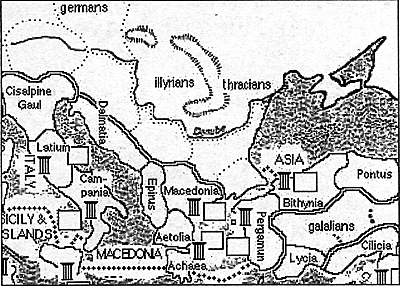 One of the most elegant campaigns I have run, in my opinion, was inspired by the "First Man in Rome" series of historical novels by Colleen McCullough. If you are at all a fan of Roman history, I highly recommend these. So far, there are five books. They begin by following the career of Gaius Marius, slowly diverging to cover Sulla and Pompey, then focussing on Julius Caesar.
One of the most elegant campaigns I have run, in my opinion, was inspired by the "First Man in Rome" series of historical novels by Colleen McCullough. If you are at all a fan of Roman history, I highly recommend these. So far, there are five books. They begin by following the career of Gaius Marius, slowly diverging to cover Sulla and Pompey, then focussing on Julius Caesar.
In my campaign, "Friends, Roman, Countrymen," all players are rival Roman magistrates -- each the head of a powerful, Senatorial family in the 1st Century B.C. Their goal is to accumulate prestige points, which are chiefly earned in battle with Rome's enemies, by conquering new territory and via economic clout through control of provinces. The prestige points are used at the end of each game year in Winter when the Senate Elections are held. Players wrangle amongst themselves for the choice assignments next year -- being elected Consul (the senior Roman magistrate), sent as governor to a rich province bordering fresh barbarian lands to conquer, or being given command to quash the Slave Revolts, punish the Numidians, etc. Rivals could be sent off to a poor province with no nearby enemies to fight.
My friends and I played 16 turns -- about three years in the campaign. Our group had shrunk to four players, at that time, and the campaign was a perfect fit for us. We'd get together on Sunday night, announce our "moves," and sit down to a few Big Battle DBA games with my 15mm Ancients. There was great incentive when playing the barbarians, too, because you didn't want your rival to succeed. The higher the margin of victory, the more prestige points he earned -- so even a narrow defeat when playing the barbarians was a victory of sorts, frustrating his chances at prestige points. And if you beat him, you could cripple his ability to launch further campaigns that year, which would really hurt him in the Senate Elections that winter.
The campaign map was a simple affair -- dividing Rome into eight provinces of unequal wealth and opportunity. Each province was further divided into two to five movement regions. Each province also had which functioned as its own "mini region" for movement and control purposes, and could resist siege. Outside of Roman territory were 11 barbarian nations, including the Gauls, Germans, Thracians, Galatians, Parthians, Moors, etc. Dotted lines delineated the barbarian territory into "potential regions" -- a player could move in and conquer these areas, turning them into new provinces and thereby enhancing his prestige in Rome. Other players could also "activate" unmolested nations, sending barbarian armies to inconvenience and frustrate the plans of their rivals.
The game year was divided into seven turns, and the player's forces could move one region per turn. Each player began with an army of 12 strength points (SP), which translated into 36 DBA elements (a "triple size" army). He was free to split up, recombine and mass his army as he pleased. Since 12 SP were the maximum allowed in a region, the safest course was to keep all his forces together. However, that often left the "back door" open to barbarians, or sometimes a player had enemies on more than one front. In addition, to control a province, the player needed strength points in more than half of the regions in a province. Thus, to control Macedonia, which had five provinces and one city, the player must have at least one strength point in four of the six. So, he HAD to split his forces at some point.
There was Sea Movement, as well, which could be risky, especially immediately before and after Winter. I once lost 3 SP during a disastrous attempt to move quickly to my newly awarded province, from my old one, by sea. There were even sea based barbarians to activate, the Mediterranean Pirates. The size of barbarian armies were rolled for randomly. If you were attempting to conquer their territory, their size was listed as relative to your own (i.e., "1 SP smaller," "Same Size," or "+1/+2/+3 SP larger"). This enabled you to invade with less than your full force, although the minimum size necessary to launch an invasion was 4 SP (12 DBA elements). If you had activated a barbarian nation, their army ranged in size from 4-9 SP. These were raiding armies -- not the full barbarian muster.
Each barbarian nation had a limited number of regions you could carve out of their territory (Armenians three, Illyrians two, Iberians one, for example). Once all were conquered, the larger ones were established as new Roman provinces that players could be assigned to in the coming Winter elections. Smaller barbarian territories were tacked onto existing Roman provinces, making them fluctuate in size and wealth. There were even the Roman client states of Egypt, Judea and Lycia. The first Roman player to enter these suffered prestige point penalties for violating the territory of an ally, who then acquiesced and became part of Rome. Egypt, potentially one of the richer provinces, could be then assembled from some of these client territories, which would erase a small amount of the stain on the player's dignitas.
In Winter, players calculated their prestige points, which translated one-for-one into votes in the Election. The players also received a random amount of additional votes each Winter, just to keep things uncertain. Each would then make a proposal to his peers, describing where each player would be sent and what office he would hold. Players secretly distributed their votes among the various proposals -- the one getting the most being adopted. However, a player who had SPs in Rome (a prestige point "no-no"), could play dictator and invalidate the election and declare who, what and where everybody would be (an even bigger prestige point penalty). Force was final, though, and the dictator's word would be law.
Winter was also the time when players received replacements for their lost SPs. Those who had suffered light losses could even raise above their forces above the initial 12, but this became progressively more difficult (to keep from rewarding a player who sat and did nothing). The amount of replacements and reinforcements were tied to the economic value of the provinces he controlled.
In the upcoming issues, I will recount the epic three years of strife we waged in the Roman world of the 1st Century B.C. You will read of the rivalry of two consuls, Druses and Gracchus, slave revolts, disasters in Gaul and the East aflame with Galatians, Parthians and Armenians invading Roman territory.

First Man in Rome
- Strive to be "First Man in Rome" DBA Campaign.
More "First Man in Rome" Campaign Rules.
Back to The Herald 40 Table of Contents
Back to The Herald List of Issues
Back to MagWeb Master Magazine List
© Copyright 2001 by HMGS-GL.
This article appears in MagWeb (Magazine Web) on the Internet World Wide Web. Other military history articles and gaming articles are available at http://www.magweb.com